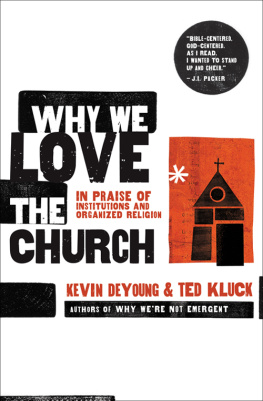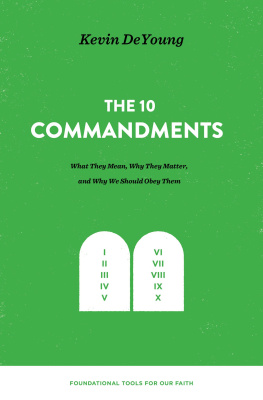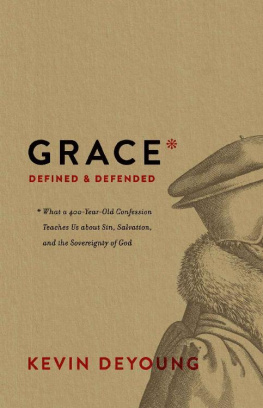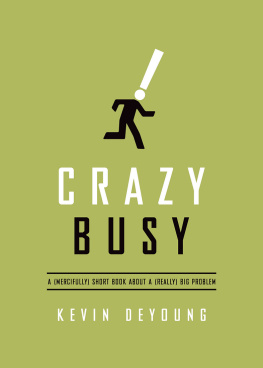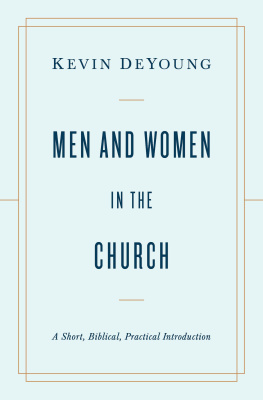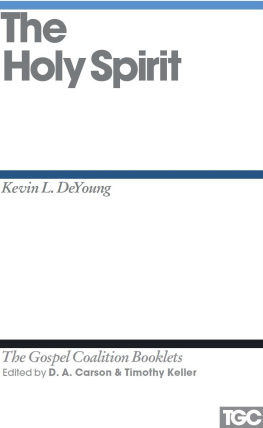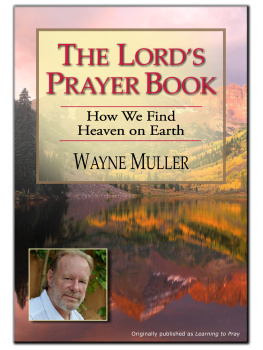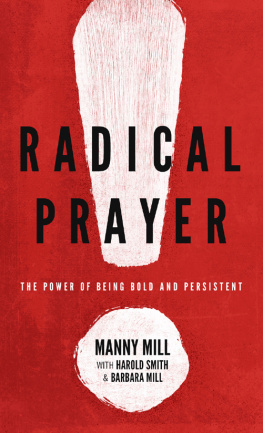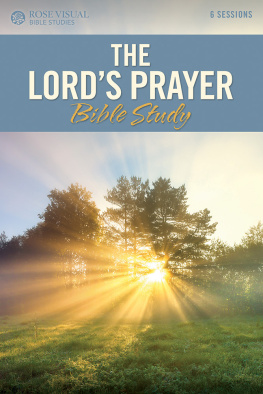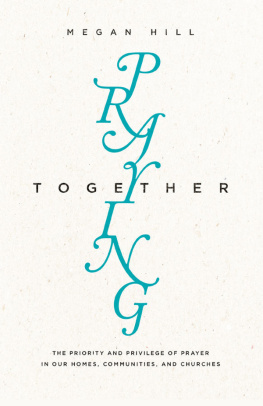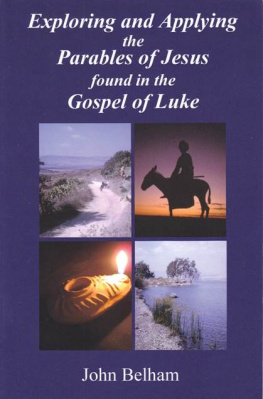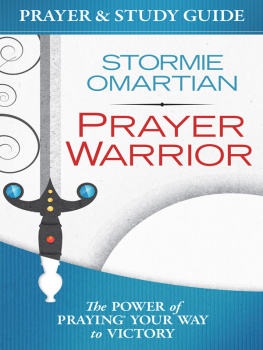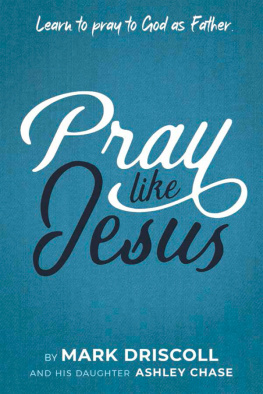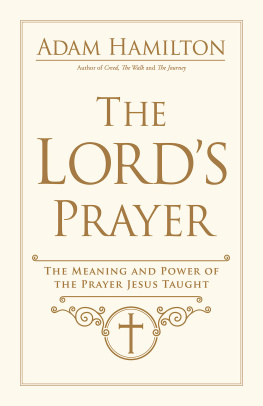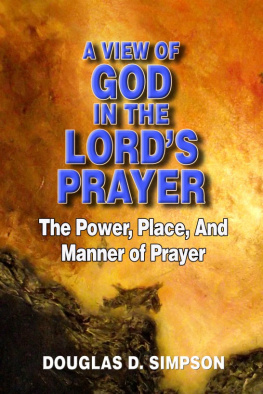Table of Contents
Landmarks
Is there any activity more essential to the Christian life, and yet more discouraging in the Christians life, than prayer?
We know we should pray. We want to pray (or at least we want to want to pray). We admire those who do pray. And yet when it comes to actually praying, most of us feel like failures.
If someone asked us right now, How is your prayer life going? very few of us would be happy for the question and confident in our response. We wish we prayed more often. We wish we prayed longer. We wish we prayed better. I bet none of us anticipates getting to the end of our lives and thinking to ourselves, You know what? I feel really good about what my prayer life has been all these years. We are much more apt to resonate with the question I read from a pastor several years ago as he reflected on his own life and prayer: How can something Im so bad at be Gods will for my life?
Ive read a lot of books on prayer over the years. The best ones make me hopeful and grateful that God invites my prayers. Too many of the books, however, make even the most earnest Christian feel like a failure for doing anything else besides prayer. I remember reading a classic book on prayer early in my ministry. It was inspirational at first but deflating by the end. The problem may very well have been in my heart, but as I recall the book, it was a relentless exhortation to more committed prayer. In my experience, nonstop focus on the ought of prayer stirs up the Christian at first but quickly wears off, leaving in its wake more guilt than prayer. While there may be a short season where you say, Yes, Im going to pray more, over the long haul you just feel this low- to medium-grade guilt for not praying enough.
But the Lords Prayer is different. It doesnt focus on the will to pray, at least not explicitly. The Lords Prayer teaches us how to pray.
A Prayer for the Ages
It is hard to overstate the importance of the Lords Prayer. Throughout church history, new converts and children have been discipled chiefly in three areas: the Apostles Creed, the Ten Commandments, and the Lords Prayer. For most of the last two millennia, it was assumed that if you were a Christian, you knew, memorized, and frequently prayed the Lords Prayer.
In one sense, John 17 is more precisely the Lords Prayer. It is the longest recorded prayer in Scripture from the Lord Jesus . What we know as the Lords Prayer is not the prayer Jesus prayed (at least not exactlyhow could he say, Forgive us our debts?), but the prayer he taught his disciples to pray.
There are two versions of the Lords Prayer, one in Luke and the more familiar one in Matthew. I dont think one prayer is dependent upon the other. A simpler explanation is that Jesus , like any itinerant preacher, taught on the same things over and over, with different words and in slightly different ways.
In Luke 11:12 Jesus s teaching is prompted by the disciples request, Lord, teach us to pray (v. 1). They must have heard something in the way Jesus was praying that made them think, We have a lot to learn. Notice what Jesus did not talk about in response to their request. He didnt teach them how long their prayers should be, or at what time of day they should pray, or how many times each day they should pray, or what they should feel as they pray, or whether they should be standing or sitting or kneeling, or if they should close their eyes and fold their hands, or whether they should lift their hands and eyes to heaven.
Its not that concern about those things is wrong. But surely its instructive that Jesus was most concerned with what they prayed, more than with when or where or for how long. This may be the most obvious and most important lesson to learn from Jesus about prayer. We can pray in the morning or in the evening, for a long time or a short time, with eyes open or eyes shut. There is freedom in a great many elements of prayer. But (1) we must not neglect praying, and (2) we must pray for the sort of things Jesus tells us to pray for.
The passage in Matthew 6:59 is part of Jesus s famous Sermon on the Mount (Matt. 57). Youve probably realized that before. What you may not have noticed is that this section in the Sermon on the Mount covers the three foundational acts of Jewish piety: almsgiving (6:14), prayer (6:515), and fasting (6:1618). These were the spiritual disciplines for first-century Jews (they would have memorized much of the Bible, but most couldnt read it daily because much of the population was illiterate, and individual families did not have Scripture scrolls in their homes). If they made New Years resolutions back then, they would have thought of giving to the poor, praying, and fasting.
Unlike Jesus s teaching in Luke, here in Matthew Jesus is concerned not just with the what of prayer but with the how of prayer. Specifically, Jesus wants to make sure we are praying for the right reasons from the right heart. In fact, that is his central concern in discussing all three acts of piety. When you give to the needy, dont make a big deal out of it. When you pray, dont do it to look good. And when you fast, dont draw attention to yourself. Jesus understands the pride and vanity that dwell in every human heart. Being religious doesnt mean you no longer seek vainglory. In fact, being religious is one of the chief ways in almost every culture that men and women find ways to nurture their pride and their vanity. What better way to look impressive before others than to be spiritually impressive?
So dont think for a moment, Well, Im a Christian, I go to church, and Im spiritual and religious. Im not in danger of these things. Actually those realities may mean we are in particular danger.
Of Course We Pray
Before we get into those specifics, however, look at the first four words of Matthew 6:5: And when you pray... Jesus doesnt have to teach his disciples that they should pray. That was already a given. He assumed they would pray, and they would have understood that prayer was not something for super-spiritual people but something that every Jew did. Dont think, Prayer is what pastors and missionaries do, or, Prayer is something I will do when Im older. Prayer is for everyone who is a true follower of God.
While it can be hard to know exactly when certain Jewish traditions developed, it seems clear that by the time of Jesus , prayer was offered in the synagogue three times a day.
If thats the case, Jesus and his disciples would have been familiar with these prayers. Jesus could assume not only that his disciples would have times of private prayer (like Jesus did), but more obviously that they would regularly attend times of corporate prayer (think of the words our and us in the Lords Prayer). When someone asks, How is your prayer life? we probably think, How am I doing with my daily devotionals first thing in the morning? Thats not bad. But Jesus s disciples probably thought of corporate gatherings where they came together and prayed. Think about the Lords Prayer itself. There is not one example of a singular pronoun in the model prayer Jesus gave to his disciples.
No onenot Jesus , not his followersquestioned that Gods people would pray. The same is no less true today. If you are a part of the family of God, you will talk to your Father. If you never talk to your earthly father (if he is alive), especially if you live in the same house, something is very dysfunctional. Of course we talk to God in prayer. He is our heavenly Father. You cant be a Christian and not pray. There is no such thing as a nonpraying Christian.
How Should We Pray?
We will get to the Lords Prayer itself in the next chapter. That is the what of prayer. For this chapter, we need to focus on the how .
According to Jesus , there are two big no-nos when it comes to how we pray: dont be like the hypocrites, and dont be like the pagans. First, then, Jesus does not want us to be like hypocrites when we pray:


